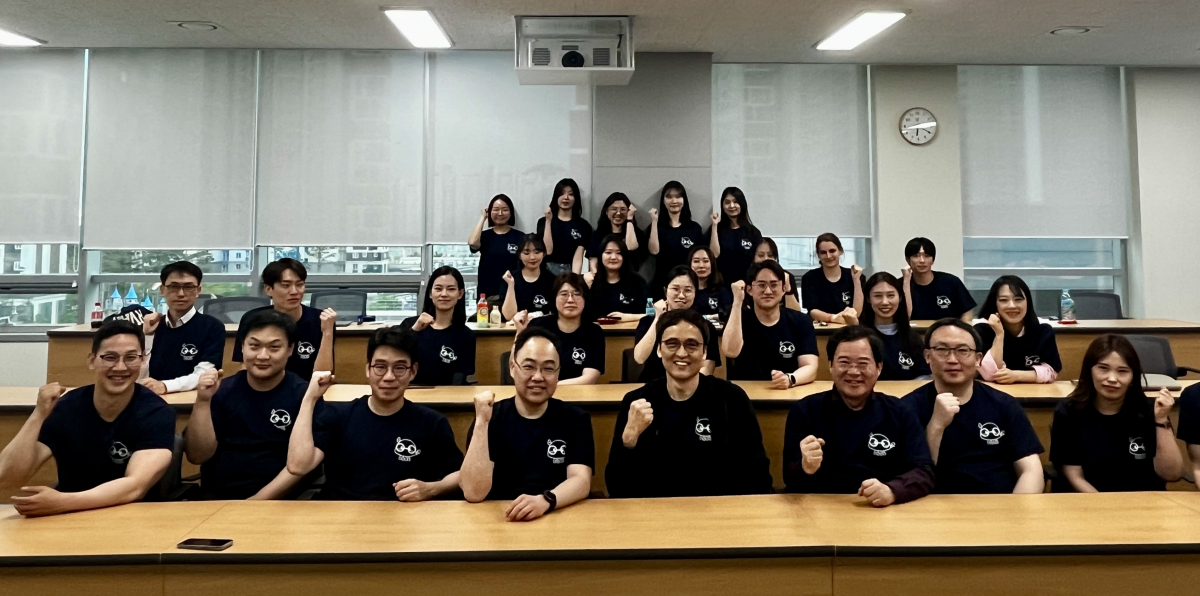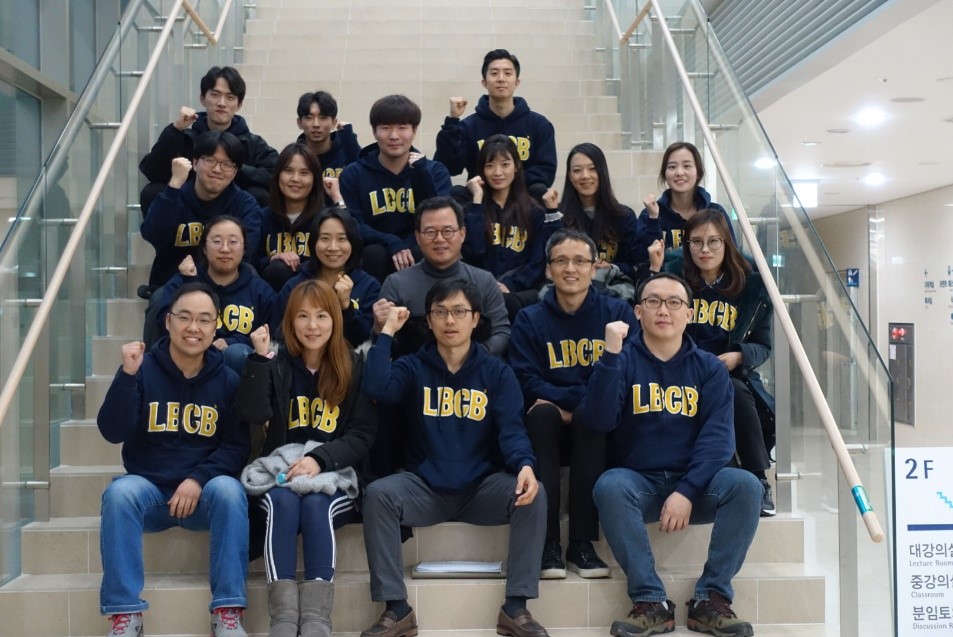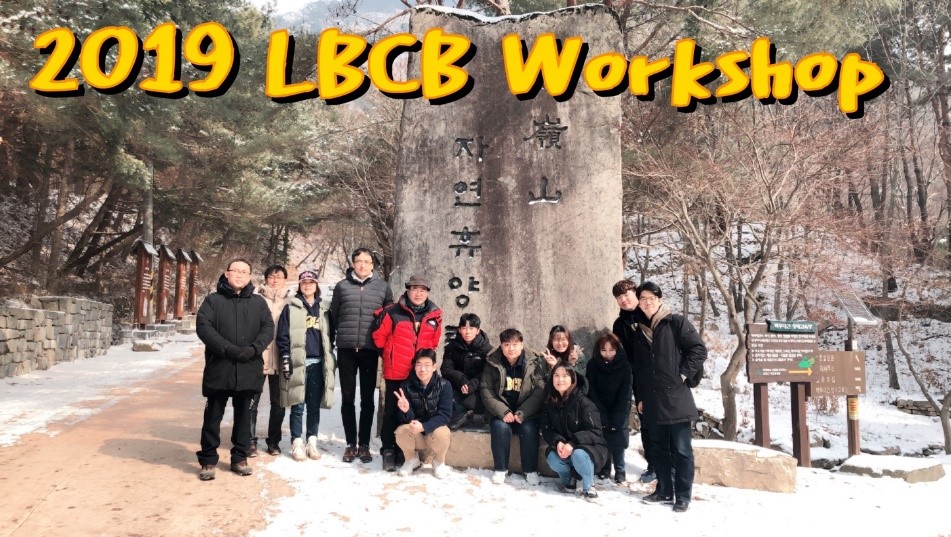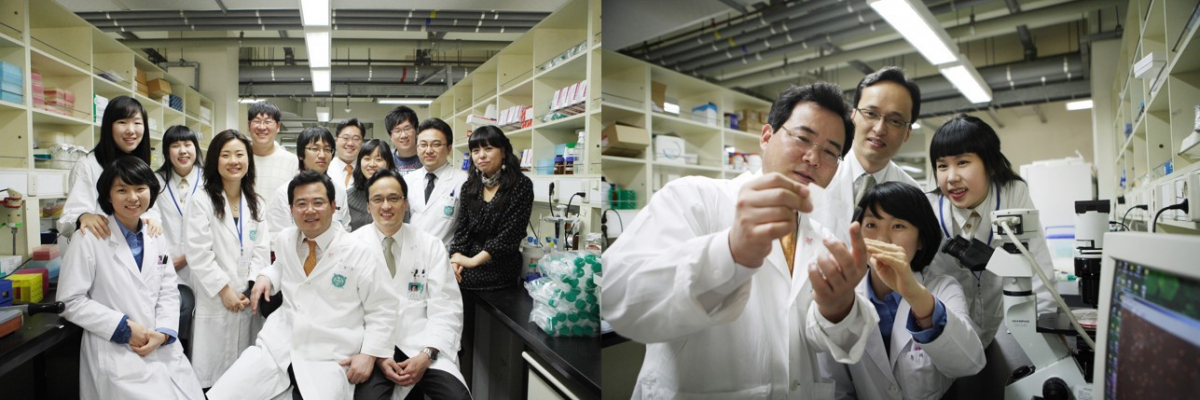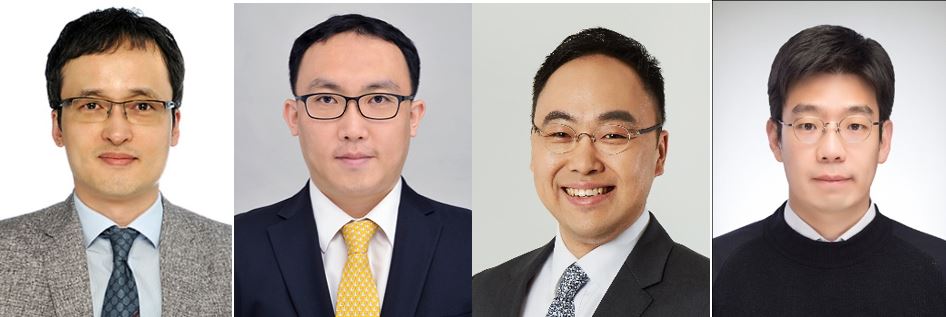
Overview
Laboratory Introduction
Laboratory of Breast Cancer Biology (LBCB)
Laboratory of Breast Cancer Biology (LBCB)
Laboratory of Breast Cancer Biology (LBCB) has established an infrastructure for collaborative research between basic science and the clinic by collecting biospecimens from patients and constructing a finely-annotated database of clinical information since the mid-1990s. Currently, over 12,000 blood samples and 2,500 tumor and normal breast specimen pairs are stored in the LBCB biorepository and data of over 26,000 breast cancer patients are constructed in the database. These resources became the basis for early research that discovered various breast cancer biomarkers using cancer genomics and proteomics. Experience with technologies such as SNP chip, gene expression microarray, and array comparative genomic hybridization (CGH) has paved the way to recent research applying next-generation sequencing for genomic analyses. We have compiled large exome, transcriptome and small RNA sequencing data that is being used for various collaborative studies. Other research topics at LBCB include tumor microenvironment, patient-derived xenograft (PDX) models, and organoid models.
Related Researcher
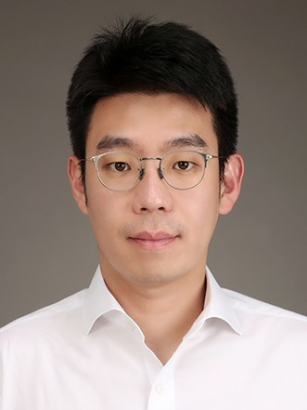
Hong Kyu Kim Professor
- Email : hkkim4592@snu.ac.kr
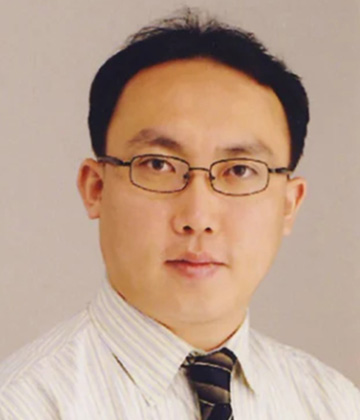
Hyeong Gon Moon Professor
- Email : moonhg74@snu.ac.kr

Han-Byoel Lee Professor
- Email : hblee.md@snu.ac.kr
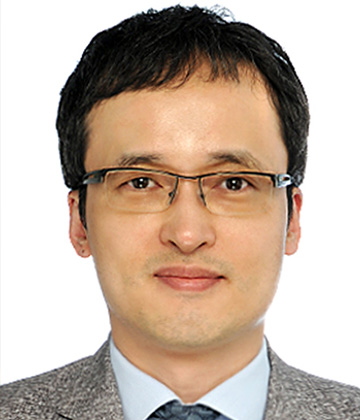
Wonshik Han Professor
- Email : hanw@snu.ac.kr
Research topics
-
1. Breast Cancer Genomics, Epigenomics, and proteomics
From our whole exome, transcriptome, and small RNA sequencing data derived from breast cancer specimens, we have identified recurrent mutations and alterations that gives us clues to the biology of breast cancer. Our research involves characterization of these genes including associated pathways and targets, and efforts to translate findings for applications in the clinic.
We have successfully developed a multi-gene breast cancer prognosis tool for predicting risk of distant metastasis using targeted RNA sequencing techniques and bioinformatics in collaboration with other institutions, including Seoul National University College of Engineering, Department of Pathology at Korea University Guro Hospital, and Asan Medical Center. The technology has led to the establishment of DCGen, Co. Ltd. by Dr. Wonshik Han, Han-Byoel Lee, and Hee-Chul Shin (Seoul National University Bundang Hospital), to whom the rights to the relevant patents has been transferred. We have also developed gene panels for molecular characterization of breast cancer and for hereditary cancer screening.
Single-cell genomics is important for overcoming tumor heterogeneity which interferes with the precise analyses of the tumor entity. We have on-going collaborative studies exploring breast cancer genomics at the single cell level.
Using proteomics techniques, we have also identified breast cancer-relevant protein signatures for potential development of diagnostic and prognostic tools.
- 2. Spatial genomics and transcriptomics
Spatial genomics and transcriptomics are new methods that pairs genomic and transcriptional data with spatial data to create maps of genomic signatures and gene expression within a given tissue. It is important to integrate the histological information of clinical samples with genomic and transcriptomic information when applying them to the clinic. Ongoing collaborative studies with the College of Engineering at Seoul National University aims to develop
3. Breast Cancer Microenvironment
Cancer is influenced by tumor microenvironment in addition to the unique characters of the tumor itself. Our research interest includes study the functional roles and the molecular mechanisms underlying the interactions between breast cancer cells and their microenvironment. Furthermore, molecular characteristics of cancer-associated adipocytes, microenvironmental effects on spatial tumor growth, and normal epithelial cells in breast cancer are research topics
4. Patient-derived Cancer Models and Organoids
Through collaborative work, we have developed patient-derived xenograft (PDX) models using breast cancer tissues of various tumor subtypes and identified functional genes implicated in the PDX engraftment. On-going research includes evaluating genomic evolution of breast cancer in PDX models and proteogenomic approach to identify key genes in PDX survival. We are continuously exploring the usefulness and clinical applicability of patient-derived models.
We have also established organoid models from breast cancers and normal breast tissue. Our research includes characterization of the organoid models, evaluating genomic evolution of breast cancer in organoid models, and development of drug screening platforms.
Research goals
LBCB aims to continue research and development not only for discovering biomarkers for early detection and prognosis prediction of breast cancer through a genetic & proteomic approach with breast cancer specimens and using them to develop related tools, but also applying them to actual clinical practice.
Research achievements
LBCB has performed in-depth research that meets clinical and experimental data, and has consistently published world-class research on the onset and early diagnosis of breast cancer, surgical treatment, and systemic therapy. In this laboratory, we published more than 400 articles in SCI journals, including high impact journals such as Nature, Nature Genetics, Nature Communications, and Journal of Clinical Oncology, registered or applied for more than 20 patents, and developed and cultured 4 types of breast cancer cell lines. Based on these research achievements, Prof. Dong-Young Noh was the first surgeon to receive the Bonn Prize in 2011; Prof. Hyeong-Gon Moon received the Bunsch Medical Award Young Medical Scientist Award in 2012; Prof. Dong-Young Noh received the Seoul National University Academic Research Award and Prof. Wonshik Han received the Seoul National University Hospital Academic Award in 2016.
The research achievements of LBCB are as follows:
Dong-Young Noh, M.D., Ph.D. : https://snucm.elsevierpure.com/en/persons/y-noh
Wonshik Han, M.D., Ph.D. : https://snucm.elsevierpure.com/en/persons/y-han-11/publications/
Hyeong-Gon Moon, M.D., Ph.D. : https://snucm.elsevierpure.com/en/persons/y-moon-7
Han-Byoel Lee, M.D., Ph.D. : https://snucm.elsevierpure.com/en/persons/y-lee-60
Hong-Kyu Kim, M.D., Ph.D.
Development and Validation of a Next-Generation Sequencing-Based Multigene Assay to Predict the Prognosis of Estrogen Receptor-Positive, HER2-Negative Breast Cancer. Lee HB, Lee SB, Kim M, Kwon S, Jo J, Kim J, Lee HJ, Ryu HS, Lee JW, Kim C, Jeong J, Kim H, Noh DY, Park IA, Ahn SH, Kim S, Yoon S, Kim A, Han W. Clin Cancer Res. 2020 Dec 15;26(24):6513-6522.
NAD(P)-dependent steroid dehydrogenase-like is involved in breast cancer cell growth and metastasis. Yoon SH, Kim HS, Kim RN, Jung SY, Hong BS, Kang EJ, Lee HB, Moon HG, Noh DY, Han W. BMC Cancer. 2020 May 4;20(1):375.
Detection of Germline Mutations in Breast Cancer Patients with Clinical Features of Hereditary Cancer Syndrome Using a Multi-Gene Panel Test. Shin HC, Lee HB, Yoo TK, Lee ES, Kim RN, Park B, Yoon KA, Park C, Lee ES, Moon HG, Noh DY, Kong SY, Han W. Cancer Res Treat. 2020 Jul;52(3):697-713.
Tumor Suppressor miRNA-204-5p Regulates Growth, Metastasis, and Immune Microenvironment Remodeling in Breast Cancer. Hong BS, Ryu HS, Kim N, Kim J, Lee E, Moon H, Kim KH, Jin MS, Kwon NH, Kim S, Kim D, Chung DH, Jeong K, Kim K, Kim KY, Lee HB, Han W, Yun J, Kim JI, Noh DY, Moon HG. Cancer Res. 2019 Apr 1;79(7):1520-1534.
PHLI-seq: constructing and visualizing cancer genomic maps in 3D by phenotype-based high-throughput laser-aided isolation and sequencing. Kim S, Lee AC, Lee HB, Kim J, Jung Y, Ryu HS, Lee Y, Bae S, Lee M, Lee K, Kim RN, Park WY, Han W, Kwon S. Genome Biol. 2018 Oct 8;19(1):158.
Single-cell RNA-seq enables comprehensive tumour and immune cell profiling in primary breast cancer. Chung W, Eum HH, Lee HO, Lee KM, Lee HB, Kim KT, Ryu HS, Kim S, Lee JE, Park YH, Kan Z, Han W, Park WY. Nat Commun. 2017 May 5;8:15081.
Transition into inflammatory cancer-associated adipocytes in breast cancer microenvironment requires microRNA regulatory mechanism. Lee J, Hong BS, Ryu HS, Lee HB, Lee M, Park IA, Kim J, Han W, Noh DY, Moon HG. PLoS One. 2017 Mar 23;12(3):e0174126.
Protein interaction network (PIN)-based breast cancer subsystem identification and activation measurement for prognostic modeling. Lim S, Park Y, Hur B, Kim M, Han W, Kim S. Methods. 2016 Jun 18.
Enhancement of Capture Sensitivity for Circulating Tumor Cells in a Breast Cancer Patient's Blood by Silicon Nanowire Platform. Kim DJ, Choi MK, Jeong JT, Lim JT, Lee HB, Han W, Lee SK. J Biomed Nanotechnol. 2016 Apr;12(4):645-55.
The Clinical Significance and Molecular Features of the Spatial Tumor Shapes in Breast Cancers. see details in our site. Moon HG, Kim N, Jeong S, Lee M, Moon H, Kim J, Yoo TK, Lee HB, Kim J, Noh DY, Han W. PLoS One. 2015 Dec 15;10(12):e0143811.
The use of FNA samples for whole-exome sequencing and detection of somatic mutations in breastcancer surgical specimens. Lee HB, Joung JG, Kim J, Lee KM, Ryu HS, Lee HO, Moon HG, Park WY, Noh DY, Han W. Cancer Cytopathol. 2015 Nov;123(11):669-77.
Recurrent fusion transcripts detected by whole-transcriptome sequencing of 120 primary breastcancer samples. Kim J, Kim S, Ko S, In YH, Moon HG, Ahn SK, Kim MK, Lee M, Hwang JH, Ju YS, Kim JI, Noh DY, Kim S, Park JH, Rhee H, Kim S, Han W. Genes Chromosomes Cancer. 2015 Nov;54(11):681-91.
Development and Validation of a Novel Plasma Protein Signature for Breast Cancer Diagnosis by Using Multiple Reaction Monitoring-based Mass Spectrometry. Lee HB, Kang UB, Moon HG, Lee J, Lee KM, Yi M, Park YS, Lee JW, Yu JH, Choi SH, Cho SH, Lee C, Han W, Noh DY. Anticancer Res. 2015 Nov;35(11):6271-9.
Prognostic and functional importance of the engraftment-associated genes in the patient-derived xenograft models of triple-negative breast cancers. Moon HG, Oh K, Lee J, Lee M, Kim JY, Yoo TK, Seo MW, Park AK, Ryu HS, Jung EJ, Kim N, Jeong S, Han W, Lee DS, Noh DY. Breast Cancer Res Treat. 2015 Oct 5.
Reduced proliferation in breast cancer cells contacting the neighboring adipocytes in human breast cancer tissues. Ryu HS, Lee HB, Han W, Noh DY, Moon HG. Breast Cancer Res. 2015 Jul 2;17(1):90.

